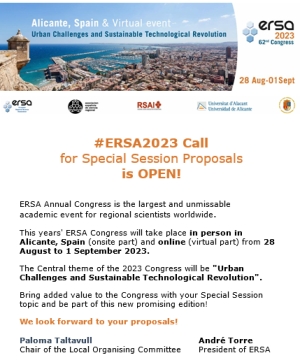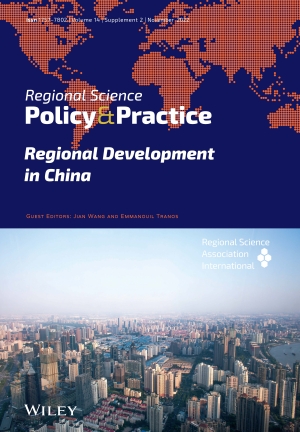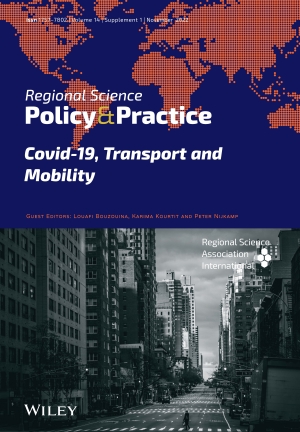Archives
Elisabete Martins
Npj Urban Sustainability: Call for Papers for the special issue “Urban inequalities and sustainability”
Npj Urban Sustainability: Call for Papers for the special issue “Urban inequalities and sustainability”
The Nature portfolio journal Npj Urban Sustainability is currently accepting submissions for a special collection entitled “Urban inequalities and sustainability” (https://www.nature.com/collections/idcehacdfi).
The deadline for submitting full papers in May 1, 2023.
The guest editors of the special collection (Andrea Caragliu, Politecnico di Milano; Chiara Del Bo, Università degli Studi di Milano; and Sumana Bandyopadhyay, University of Calcutta) welcome submissions across a broad range of disciplines and topics related to urban inequalities. Both empirical and theoretical contributions to the collection are welcome; however, the latter should examine empirically and/or policy- relevant issues, and provide some real world data as a starting point.
In particular, the editors welcome papers that deal with the determinants and the impact of urban inequalities, including, but not limited to, institutional quality, public governance, income, and well-being, health, schooling, housing and environmental inequalities, all declined along the urban dimension. Papers from both the Global North and Global South should address the following themes: Urban-rural inequalities; Within- and across-cities socio-economic inequalities; Environmental inequalities.
Please notice that Npj Urban Sustainability is an open access journal. Information on APCs is available here: https://www.nature.com/npjurbansustain/apc
For any question, do drop us a line at This email address is being protected from spambots. You need JavaScript enabled to view it.; This email address is being protected from spambots. You need JavaScript enabled to view it.; and This email address is being protected from spambots. You need JavaScript enabled to view it..
Executive Director School of Labor and Employment Relations, University of Illinois at Urbana-Champaign, Climate Jobs Institute
The School of Labor and Employment Relations invites applications for the inaugural Executive Director of the Climate Jobs Institute (CJI). The successful candidate will provide visible and compelling leadership to establish the Institute’s reputation as a state, national and global leader in research on workforce, societal and economic impacts of moving toward a cleaner energy future. Newly established and funded by the Illinois Legislature in 2022, the Climate Jobs Institute will produce high-quality, reliable, and accurate quantitative analysis and research on labor, employment, and the broader social and economic impacts of decarbonization. The Climate Jobs Institute’s research and educational programming will support the State of Illinois’s transition to a strong, equitable decarbonized economy. As the State has established itself as an early mover within the U.S. on these issues, the research conducted by the CJI also stands to have considerable impact on other federal, state and local policies beyond Illinois, making this a particularly timely and exciting opportunity.
The Climate Jobs Institute’s activities include:
- Evaluating how workforce opportunities in the clean-energy industry can provide just transitions for displaced energy workers in the State of Illinois and beyond.
- Quantifying the impacts of decarbonization on economic development, employment and growth in the State of Illinois and beyond.
- Identifying opportunities to maximize job creation and workforce development in the State’s clean-energy industry, being particularly mindful of job creation in historically underrepresented populations and environmental justice communities.
- Recommending policies that will create high-quality family- and community-sustaining jobs in the clean-energy economy.
- Developing strategies to address current and future supply chain vulnerabilities and challenges in the clean-energy manufacturing industry.
- Identifying how to expand access to high-quality clean energy jobs for environmental justice communities and other frontline communities that have faced historical inequities (e.g., best practices for building pipelines of workers through on-the-job training programs, job hubs, and apprenticeship programs).
- Assessing the types of support that local governments will need to help communities develop their own community energy, climate and jobs plans.
- Evaluating initiatives, identifying research support and promulgating best practices for specific programs (e.g., Public Schools Carbon-Free Assessment programs).
- Collaborating with related Institutes and Centers at the University of Illinois on joint/interdisciplinary research, policy recommendations, academic publications, and external funding proposals related to clean energy initiatives.
- Publicly disseminating research and recommendations via a wide range of outlets, including public policy reports, top tier peer-reviewed academic articles, interactive web platforms, and other outreach and education programs for labor, communities, law makers, and media.
The University of Illinois is frequently lauded as a pioneer in interdisciplinary research, and has made considerable investments in research infrastructure related to environment and clean energy and related policy considerations. The Climate Jobs Institute will join this broader research ecosystem, with opportunities to collaborate with other centers and institutes on campus, including the Institute for Sustainability, Energy and Environment (iSEE), the Prairie Research Institute, the Institute of Government and Public Affairs, and the Center for Social and Behavioral Science.
QUALIFICATIONS
The successful candidate will hold a doctoral degree relevant to the mission and goals of the institute and have an outstanding record of scholarly accomplishments appropriate for appointment as a tenured full professor at a leading research university. While a full professor is preferred, candidates with records appropriate for appointment as advanced tenured associate professors may also be considered. Disciplinary background may vary, but could include environmental economics, energy economics, labor economics, political economics, political science, public policy, urban and regional planning, community development, or a related field. The candidate is expected to have significant experience in bringing science to bear on public policy decisions (e.g., labor policy, workforce development); experience managing a scientific institute or organization of comparable scope and complexity; ability or experience in forming and maintain relationships with state, federal, and relevant non-governmental organizations; an established record of obtaining sponsored funding from state, and federal agencies and the private sector; and administrative experience in actively facilitating research endeavors. The Executive Director will provide vision, energy and enthusiasm, and have excellent communications and strategic planning skills. They will also have strong organizational and interpersonal skills, including being comfortable interacting with various constituents of the campus and of external communities (e.g., legislators, labor union leaders, environmental advocacy organization leaders, renewable energy industry leaders). The successful candidate will have excellent budget management and decision-making skills, and the ability to prioritize and manage multiple ongoing projects and proposals simultaneously. The committee would prefer candidates who have familiarity with academic research environments, and skill or experience in academic administration and communicating with legislators is desirable.
RESPONSIBILITIES
- Provide leadership, direction and overall administration for development and implementation of applied research, academic research and publications, grants, education programs, initiatives, and other activities of the Institute.
- Develop the mission statement and objectives, initial structure, business plan, and budget for the Institute, in line with the school’s and University’s mission and with the advice and support of the LER dean and the Climate Jobs Advisory Council.
- Develop, prioritize, and deliver on research projects in support of standing research needs and emergent requests from the Illinois State Legislature.
- Identify and secure state, federal, and private sources of grant funding.
- Actively engage in discussions with other research institute directors at the University of Illinois regarding opportunities for collaboration, and support collaborative efforts in social science, science, engineering and the arts and humanities.
- Report regularly to the dean of LER to obtain input and advice, and to report on the activities, plans, and outcomes of the Institute, including a formal, written annual report.
- Serve as chair and convene the Climate Jobs Advisory Council, to obtain input and report on the activities, plans, and outcomes of the Institute.
- Manage the Institute’s human and financial resources and physical infrastructure.
- Elevate CJI’s profile and reputation, through engaged representation at conferences, meetings, education events, media outreach, communication platforms, and public events.
- Actively engage with multiple faculty within LER and/or other units at Illinois, involving them in the work of the CJI. This can include short-term projects, programs, or other activities.
- Encourage and lead a strong commitment to diversity through establishing retention and recruiting priorities for the institute, as well as personally exhibiting a commitment to inclusion.
Founded in 1867, the University of Illinois is a world-class leader in research, teaching and public engagement. Widely noted for research excellence, even among the nation’s most elite institutions, for the last several years running, Illinois has been awarded more National Science Foundation funding than any other University in the world.
Originally founded as the Institute for Labor and Industrial Relations in 1946, the School of Labor and Employment Relations (LER) has more than 20 faculty members with expertise that spans virtually every aspect of the employment relationship. Our degree programs provide students with the breadth of knowledge to become effective practitioners in corporate settings or in labor union leadership, as well as the flexibility to build a depth of knowledge in critical aspects of employment. Our Labor Education Program (LEP) provides technical training, conferences and professional development for more than 2,000 union leaders each year.
Urbana-Champaign is centrally located between Chicago, St. Louis, and Indianapolis. Learn more at https://yourewelcomecu.com/. The University is a land-grant institution that provides access to world-class facilities, Big Ten athletic events, and international acclaimed cultural opportunities.
To find out more about the resources available at the university and in the Urbana-Champaign community please visit these sites:
Dual Career Program
Benefits
Living in Champaign-Urbana
Appointment Information
This is a 100% full-time tenured faculty (Professor) position, appointed on a 12-month basis. The position reports to the Dean of the School of Labor and Employment Relations. The appointment has a start date that is negotiable. Salary is commensurate with experience.
Application Procedures & Deadline Information
Applications must be received by 6:00 pm (CST) on January 31, 2023. To apply for this position, please create a candidate profile at http://jobs.illinois.edu and upload your letter of interest, curriculum vitae, and names/contact information of three professional references. For self-nominations from current Illinois faculty, the endorsement of the candidate's dean and unit head/chair will be solicited. Interviews may be conducted before the closing date; however, no hiring decision will be made until after that date. Complete applications received by November 27, 2022, will receive full consideration, but applications will be accepted until a candidate for hire is identified. Applications not submitted through http://jobs.illinois.edu will not be considered.
For further information regarding the position, please contact one of the search committee co-chairs: Professor Dan Newman (email at This email address is being protected from spambots. You need JavaScript enabled to view it. or phone at 217-244-2512) or Professor Madhu Khanna (email at This email address is being protected from spambots. You need JavaScript enabled to view it. or phone at 217-333-5176). You may also visit http://www.ler.illinois.edu for additional information. For questions regarding the application process, please contact 217-333-2137.
https://illinois.csod.com/ux/ats/careersite/1/home/requisition/1824?c=illinois
Lecturer in Geographic Data Science Grade 8 (Human Geography) Geography and Planning
|
||||||||||||||||||||||||
FEB Zagreb 2023 14th International Odyssey Conference on Economics and Business – Poreč, Istria, Croatia – May 10-13, 2023
FEB Zagreb 2023 14th International Odyssey Conference on Economics and Business – Poreč, Istria, Croatia – May 10-13, 2023
Traditional 14th international scientific conference organized by the University of Zagreb Faculty of Economics & Business, FEB Zagreb 2023 14th International Odyssey Conference on Economics and Business, will be held in Poreč, Istria, Croatia from May 10-13, 2023, with the possibility of online participation.
Conference promotes the exchange of scientific and practical experiences, as well as bringing together researchers and practitioners in constructive discussion about the contemporary challenges in economics and business.
We are pleased to invite all the interested authors to send their papers by March 1st, 2023, or abstracts by April 15th, 2023, and to present them at the Odyssey conference.
More about the conference is available at: https://odyssey.net.efzg.hr/.
In case of additional questions, contact the Organizing Committee via e-mail: This email address is being protected from spambots. You need JavaScript enabled to view it..
Contact person: Petra Halar, PhD
Department Chair, Department of Social Sciences, Illinois Institute of Technology
Department Chair, Department of Social Sciences, Illinois Institute of Technology
The Department of Social Sciences at Illinois Institute of Technology seeks applicants for the position of department chair. Candidates should have experience with academic leadership; a terminal degree in political science, sociology, geography, public policy, urban planning or a closely related field; and a research record appropriate for appointment at the rank of Full Professor. A successful candidate will show an interest in developing dynamic partnerships with STEM- and policy-related fields, in both curricular and interdisciplinary research initiatives, and will speak to how their research, teaching, or leadership activities have contributed, or will contribute, to a more inclusive and equitable environment in the relevant sectors. Therefore, we seek an individual experienced with interdisciplinary undergraduate and graduate programs who has the ability to take a leadership role in developing new programs and expand existing ones; who will work to connect the social sciences to other areas of strength on the Illinois Tech campus; whose teaching can contribute to our existing curriculum and our planned growth; and who could lead pedagogical efforts to work with Chicago area communities, including the Bronzeville neighborhood where the Illinois Tech campus is located.
THE DEPARTMENT
Situated within the Lewis College of Science and Letters, the Department of Social Sciences has eight full-time faculty members. The department offers bachelor’s degrees in social and economic development policy and in global studies, as well as a new BS degree in science, technology, and society. In addition to its bachelor’s programs, the department plays a central role in delivering the core curriculum requirements of the university. The department also works with the university’s Chicago-Kent College of Law and Stuart School of Business to deliver joint, accelerated courses of study, allowing social sciences undergraduates interested in graduate study in law or public policy and administration to earn those degrees faster. The department is presently developing a joint MS program in Computational Social Sciences with the College of Computing.
THE UNIVERSITY
Illinois Tech is a private Ph.D.-granting research university with world-renowned programs in engineering, architecture, the sciences, humanities and social sciences, psychology, business, law, and design. Founded in 1890, Illinois Tech was built on the promise to provide access to higher education for students from all different backgrounds and to make a difference in the world through technology-oriented education. This guiding mission and purpose – where students, including those underrepresented in technology, could prepare for meaningful roles in a changing industrial society and achieve professional and economic advancement – remains just as relevant today. As such, diversity and inclusion are part of the day-to-day experience at Illinois Tech and a central component of its culture. Illinois Tech is home to a diverse and global student population, is committed to providing opportunities to enhance the diversity of its faculty and staff, and strongly encourages applicants from all backgrounds to apply for this position, especially those underrepresented in the field.
HOW TO APPLY
Applicants should prepare the following, and send as one pdf file the following directly to the search committee chair Dr. Matthew Bauer (email: This email address is being protected from spambots. You need JavaScript enabled to view it.) with the subject line “Social Sciences chair search”:
- A brief, one or two page cover letter addressing qualification for the position, ability to lead a small, interdisciplinary department, and general administrative philosophy, which includes illustrative examples of how leadership style has led to specific outcomes,
- A brief, one or two page research statement demonstrating how the applicant’s current research adds to existing strengths in political science, sociology, geography, public policy, or urban planning, and
- A curriculum vitae, including contact information for three references.
References will not be contacted unless applicants are selected for further review. The initial review of applications will begin December 15, 2022 and continue until the position is filled. Questions about this position can be directed to the search committee chair, Dr. Matthew Bauer (e-mail: This email address is being protected from spambots. You need JavaScript enabled to view it.).
Illinois Institute of Technology is an EEO/AA/Title VI/Title IX/Section 504/ADA/ADEA employer dedicated to building a community of excellence, equity, inclusion and diversity. It is committed to fostering an inclusive environment and actively seeks applications from individuals of all backgrounds and identities regardless of race, color, sex, marital status, religion, national origin, disability, age, unfavorable discharge from the military, status as a protected veteran, sexual orientation including gender identity and expression, order of protection status, and/or genetic information. All qualified applicants will receive equal consideration for employment.
Assistant Professor, Public Policy, Greenspun College of Urban Affairs, Univ. of Nevada, Las Vegas
The School of Public Policy and Leadership (SPPL) at The University of Nevada, Las Vegas invites applications for a position at the Assistant Professor level in the area of Sustainability, with a focus on urban resilience and sustainability. SPPL is part of the Greenspun College of Urban Affairs (GCUA).
For details and job application, follow the link below,
ERSA Monthly E-news - November 2022
|
|
|
|
|
|
|
|
|
|
|
|
|
|
|
|
|
|
|
|
|
|
|
|
|
|
|
|
|
|
|
|
|
|
|
|
|
|
#ERSA2023 Call for Special Session Proposals is OPEN
|
|
|
|
|
|
|
|
The latest issue of Regional Science Policy & Practice are available! Vol. 14, No. S2, November 2022, Special Issue: Regional Development in China
|
Regional Science Policy & Practice Pages: 1-180 November 2022 Issue Edited by: Jian Wang, Emmanouil Tranos |
ISSUE INFORMATION
![]() Free Access
Free Access
Pages: 1-2 | First Published: 21 November 2022
INTRODUCTION
Jian Wang, Emmanouil Tranos
Pages: 3-4 | First Published: 21 November 2022
ORIGINAL ARTICLES
Spatial agglomeration and firm productivity: Does trade status matter?
Qing Liu, Jian Wang
Pages: 5-18 | First Published: 02 September 2021
![]() Open Access
Open Access
Jie Duan, Xue-Ying Chen, Yan Song, Xian-Jun Huang
Pages: 19-35 | First Published: 09 November 2020
Shengxia Xu, Qiang Liu, Huihui Sun
Pages: 36-59 | First Published: 15 June 2022
Network capital and economic growth of major urban agglomeration regions in China
Hongming Zhang, Tieshan Sun, Yuanxi Li
Pages: 60-75 | First Published: 11 October 2022
Price and income elasticities of electricity in China: Estimation and policy implications
Yumin Li, Yan Jiang, Shiyuan Li
Pages: 76-90 | First Published: 27 June 2020
Public Debt Competition in Local China: Evidence and Mechanism of Spatial Interactions
Dechun Liu, Xinye Zheng, Yihua Yu
Pages: 91-105 | First Published: 09 January 2022
Does urban shrinkage lower labor productivity? The role of spatial expansion
Zhuqing Yang, Yuanyuan Zhu, Yulin Zhang
Pages: 106-117 | First Published: 18 March 2020
Jie Huang, Yixin Shen, Jianjun Chen, Ying Zhou
Pages: 118-137 | First Published: 15 June 2022
Regional agricultural cooperatives and subjective wellbeing of rural households in China
Lei Wu, Chuanjian Li, Yang Gao
Pages: 138-158 | First Published: 10 December 2021
Yuan Yuan, Xintong Sun, Ning Liu
Pages: 159-180 | First Published: 10 May 2022
The latest issue of Regional Science Policy & Practice are available! Vol. 14, No. S1, November 2022, Special Issue: Covid-19, Transport and Mobility
|
Regional Science Policy & Practice Pages: 1-195 November 2022 Issue Edited by: Louafi Bouzouina, Karima Kourtit, Peter Nijkamp |
ISSUE INFORMATION
![]() Free Access
Free Access
Pages: 1-2 | First Published: 21 November 2022
INTRODUCTION
Covid‐19, transport and mobility
Louafi Bouzouina, Karima Kourtit, Peter Nijkamp
Pages: 3-5 | First Published: 21 November 2022
ORIGINAL ARTICLES
![]() Free Access
Free Access
Louafi Bouzouina, Karima Kourtit, Peter Nijkamp
Pages: 6-20 | First Published: 05 July 2022
![]() Open Access
Open Access
Bart Roelofs, Dimitris Ballas, Hinke Haisma, Arjen Edzes
Pages: 21-40 | First Published: 09 August 2022
![]() Free Access
Free Access
The effect of COVID‐19 on long‐distance transport services in France
Florent Laroche
Pages: 41-60 | First Published: 07 April 2022
![]() Open Access
Open Access
Which factors influence mobility change during COVID‐19 in Germany? Evidence from German county data
Andree Ehlert, Jan Wedemeier
Pages: 61-79 | First Published: 16 April 2022
![]() Free Access
Free Access
Patrícia C. Melo
Pages: 80-106 | First Published: 21 February 2022
![]() Free Access
Free Access
Evolution of urban mobility behaviour in Brussels as a result of the COVID‐19 pandemic
Alice de Séjournet, Cathy Macharis, Sara Tori, Lieselot Vanhaverbeke
Pages: 107-121 | First Published: 16 March 2022
![]() Free Access
Free Access
Ali El Zein, Adrien Beziat, Pascal Pochet, Olivier Klein, Stephanie Vincent
Pages: 122-141 | First Published: 23 February 2022
![]() Open Access
Open Access
João de Abreu e Silva
Pages: 142-161 | First Published: 14 June 2022
![]() Free Access
Free Access
Mischa Young, Jaime Soza-Parra, Giovanni Circella
Pages: 162-178 | First Published: 31 January 2022
![]() Open Access
Open Access
Browsing for food: Will COVID‐induced online grocery delivery persist?
Hannah Younes, Robert B. Noland, Wenwen Zhang
Pages: 179-195 | First Published: 05 May 2022
About Us
The Regional Science Association International (RSAI), founded in 1954, is an international community of scholars interested in the regional impacts of national or global processes of economic and social change.

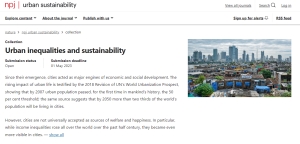
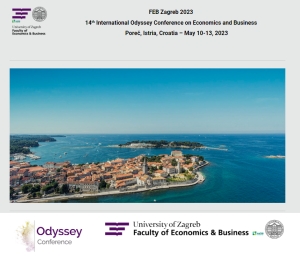
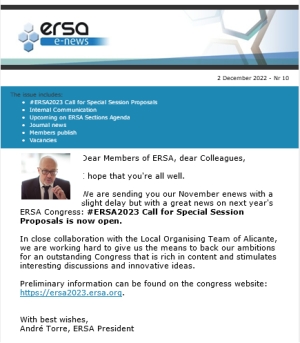

 Dear Members of ERSA, dear Colleagues,
Dear Members of ERSA, dear Colleagues,


 Miroslav Šipikal is the new President of the Slovak Section!
Miroslav Šipikal is the new President of the Slovak Section!
 RSAI Councillor-at-Large
RSAI Councillor-at-Large 











